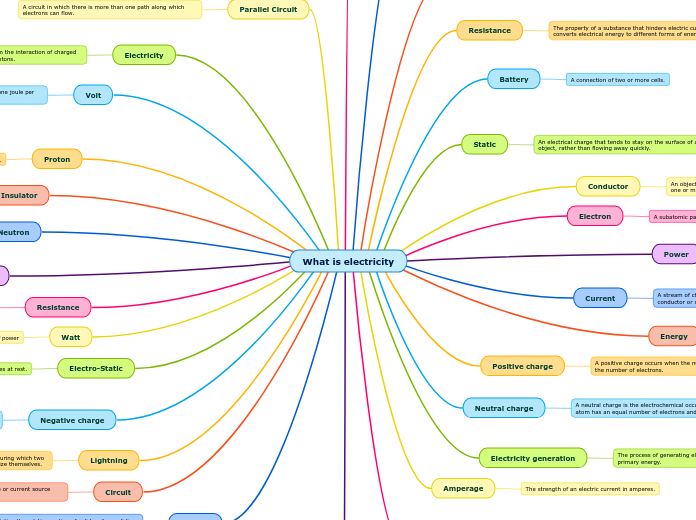What is electricity
Series Circuit
A circuit in which there is only one path along which electrons can flow.
Ampere
The unit of electrical current, equivalent to one coulomb per second.
Resistance
The property of a substance that hinders electric current and converts electrical energy to different forms of energy.
Battery
A connection of two or more cells.
Static
An electrical charge that tends to stay on the surface of an object, rather than flowing away quickly.
Conductor
An object or type of material that allows the flow of charge in one or more directions.
Electron
A subatomic particle with a negative electrical charge.
Power
Power is the rate, per unit time, at which electrical energy is transferred by an electric circuit.
Current
A stream of charged particles, moving through on electrical conductor or space.
Energy
The type of energy produced by a moving electrical charge.
Positive charge
A positive charge occurs when the number of protons exceeds the number of electrons.
Neutral charge
A neutral charge is the electrochemical occurrence where an atom has an equal number of electrons and protons.
Electricity generation
The process of generating electric power from sources of primary energy.
Amperage
The strength of an electric current in amperes.
Repulsion
The electric or magnetic force by which one object pushes another one away from it.
Ohm
The unit for resistance, equivalent to one volt per ampere.
Parallel Circuit
A circuit in which there is more than one path along which electrons can flow.
Electricity
A form of energy that results from the interaction of charged particles, such as electrons or protons.
Volt
The unit for potential difference, equivalent to one joule per coulomb.
Proton
A subatomic particle with a positive electrical charge.
Insulator
An object or a material that does not allow the flow of an electrical current freely
Neutron
A subatomic particle with almost an identical mass as a proton but without an electrical charge.
Voltage
An electromotive force or potential difference expressed in volts.
Resistance
The electrical resistance of an object is a measure of its opposition to the flow of electric current
Watt
The watt is a unit of power
Electro-Static
A branch of physics that studies electric charges at rest.
Negative charge
A positive charge occurs when the number of electrons exceeds the number of protons.
Lightning
A naturally occurring electrostatic discharge during which two electrically charged regions temporarily equalize themselves.
Circuit
A path in which electrons from a voltage or current source flow.
Friction
The force resisting the relative motion of solid surfaces sliding against each other.
Renewable resource
A useful energy that is collected from renewable resources.
